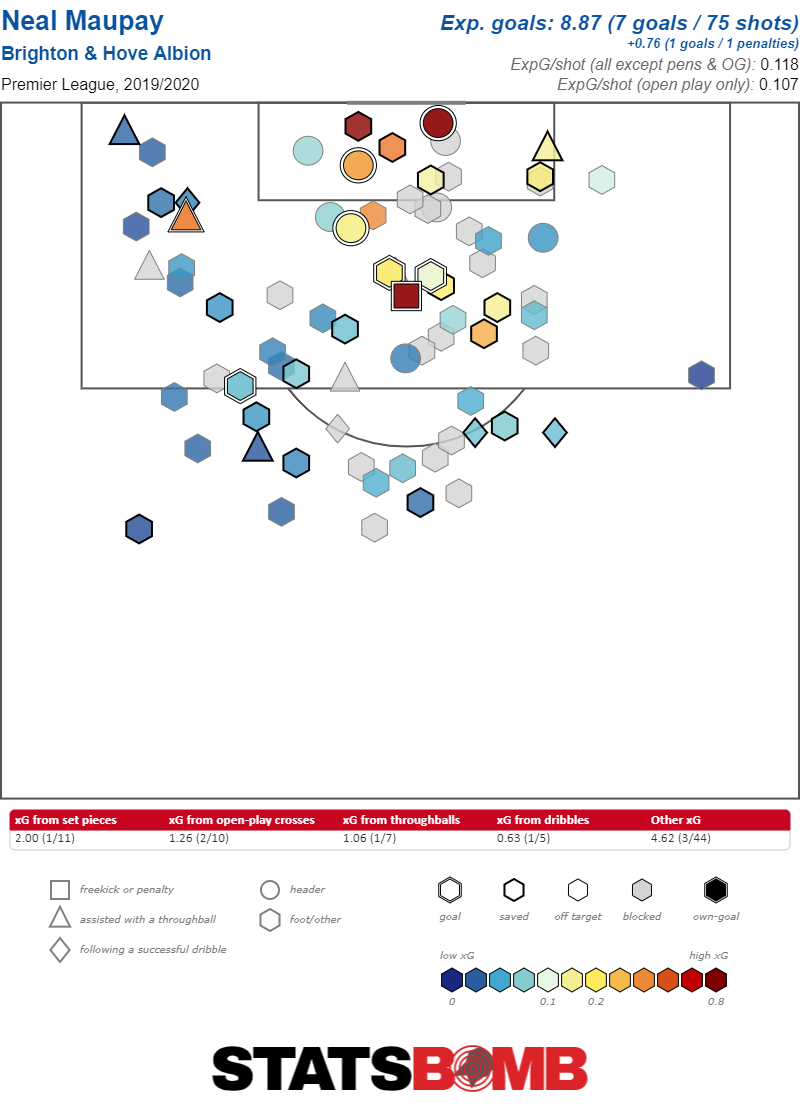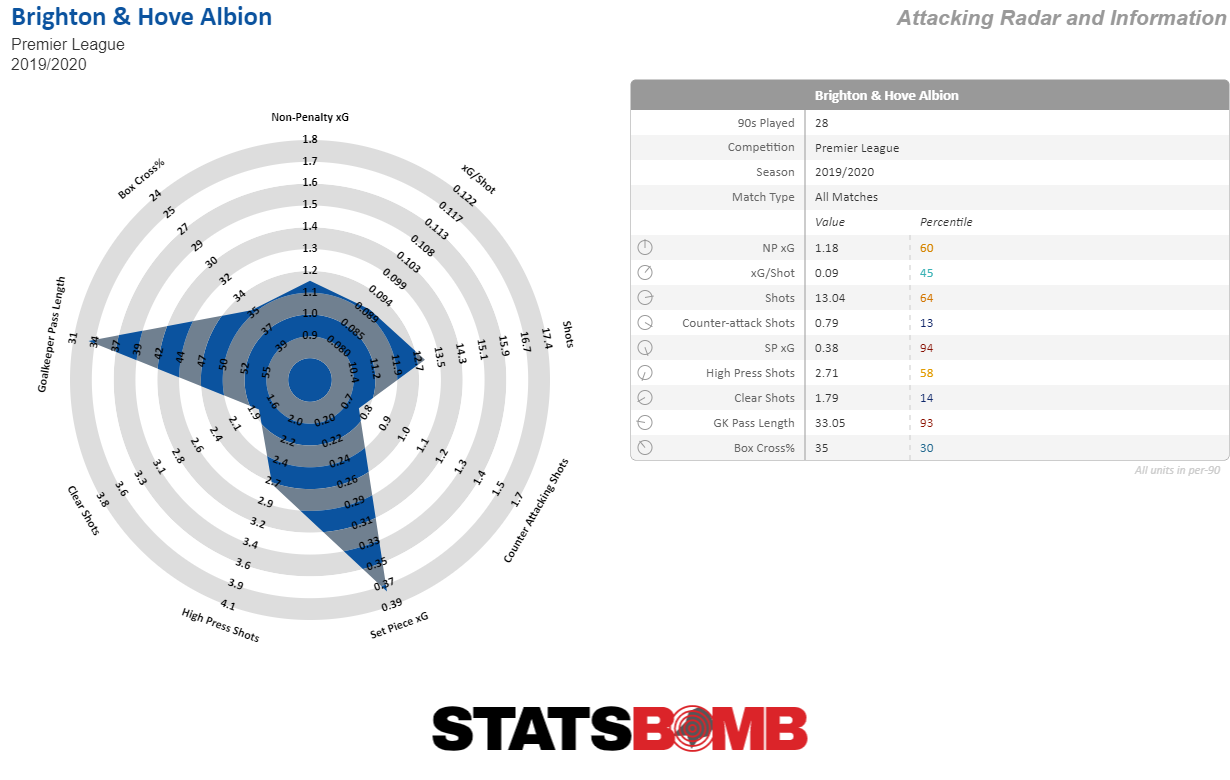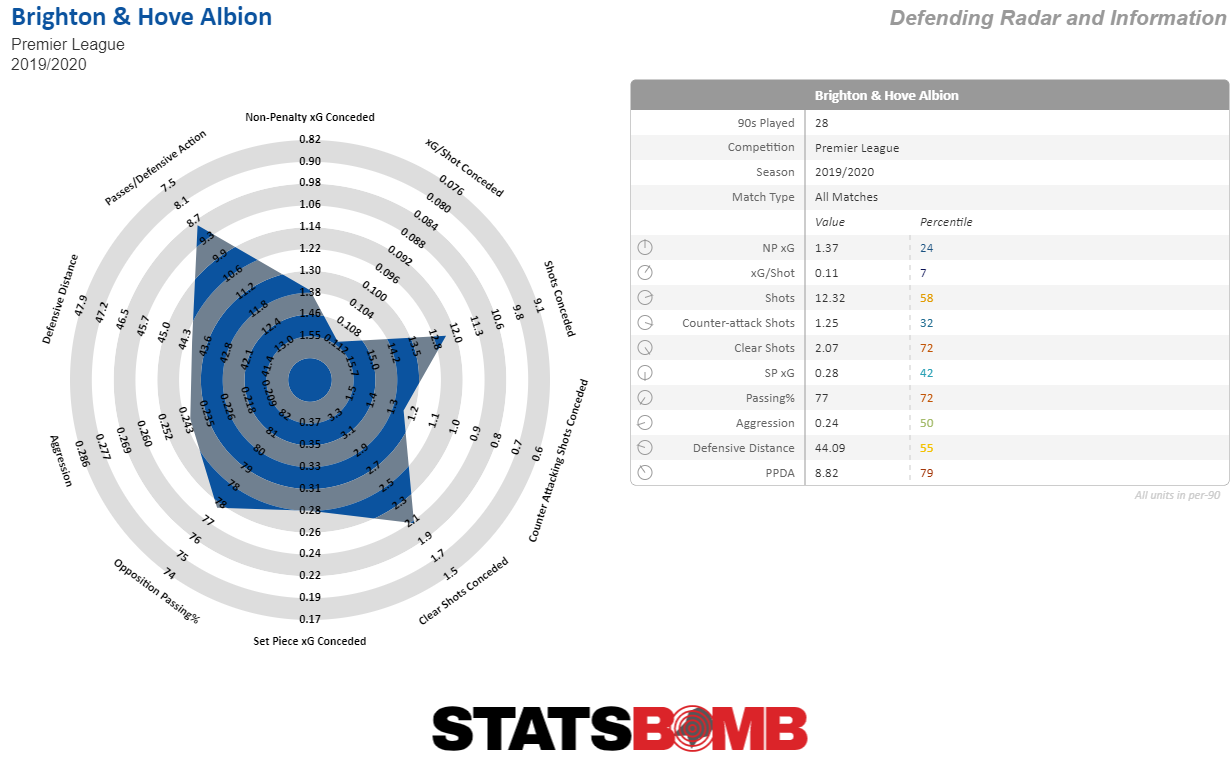The basic problem with Brighton and Hove Albion is that they’re not very good. This, to be fair to Brighton and offer a glimmer of hope to their fans, is true of many Premier League sides. Some go down; some don’t. Having survived while being stultifyingly not good under Chris Hughton, Brighton may yet survive while being more engagingly not good under Graham Potter. Despite being the only side in England’s top four divisions without a win in 2020, Brighton still aren’t in the bottom three. This doesn’t reflect well on the Seagulls or their rivals.
The basic problems with Brighton that Grace identified in December remain: Potter has Brighton passing more than under Hughton, but few of the passes are in dangerous areas; the new manager also has the Seagulls pressing more, but teams regularly break through and get good shots; striker Neal Maupay is having a below-average finishing season. These were worrying signs three months ago. That they remain largely unsolved after three further months of futility is concerning.

Brighton may be okay enough for the Premier League anyway. If sustained, their current expected goal difference of -0.21 per 90 minutes would be their best mark since getting promoted in 2017. It’s also the 13th-best in the league. Upgrading the attack from “notional, at best” to “unambiguously below average” has more than offset the loss of Hughton’s defensive solidity. Brighton’s margin for error going forward is limited by sides like Crystal Palace and Newcastle, having banked points while playing terribly. Still, it wouldn’t be a shock for the Seagulls to serve as a reminder that it’s normal for teams that are below average across the board to stay in the Premier League.
While Graham Potter has made an aesthetic improvement at Brighton by periodically having his players do things, it is hard to convey the uniformity of their not-very-goodness. Finding facets of the game where Brighton are meaningfully above average is a genuine challenge. Here’s the best I could do:
- Goalkeeper Matthew Ryan is taking the second-shortest passes of any goalkeeper in the Premier League. This represents a big shift from last year when he was lumping the ball more than six yards longer than the league average.
- Speaking of possession, Brighton trails only the top five clubs with a 55% rate. Here again, we see clear signs that Potter has changed Brighton. At best, though, this is defensive possession. When it comes to doing much of anything with the ball, however, Potter’s side remains an extreme work in progress.
- Seeing as doing things with the ball in open play, save for the occasional moment of Pascal Gross inspiration, really isn’t Brighton’s thing this season, it’s a good thing the Seagulls are fifth in the league when it comes to expected goals per set piece. They’re particularly good at turning indirect free kicks into expected goals, and are among the top performers when it comes to direct free kicks and corners. Of course, not doing anything with the ball in open play means that Brighton are also quite bad at actually getting corners or free kicks.

If that looks like grasping at straws, just wait until you see where else Brighton stands out:
- Brighton concedes among the fewest shots from outside the box. This can be a good sign; Liverpool and Leicester concede similarly few shots from outside the box as part of an overall focus on shot suppression. In Brighton’s case, however, it’s mainly a sign that attackers are getting into the penalty box. Opponents are taking the league average volume of shots against the Seagulls, but those shots are coming from closer than the league average.
- The Seagulls have benefitted from opponents scoring four own goals this season. Only one other team has benefitted from three. One could definitely argue this has something to do with pressure, but tactical revolutions are not built on having the most opposition own goals in the league.

None of this is an indictment of Potter, per se. Brighton are playing better than in previous seasons and stylistic changes can take time to implement. Squint hard enough and you can see the rough draft of an improved Potter side in this year’s team. There’s also the not insignificant matter of working with a small squad that is getting old. This side cannot be expected to be among the best in the Premier League. Rather, the most salient critique of Potter is that his side’s fundamental issues remain unaddressed after being clear for months. If they stay up, that can be chalked up to a transition year. If they go down, it could be read as negligence.
Still, after months without a win and with a relegation battle on the horizon, it sure would be helpful if Brighton were good at a few things. You can stay in the Premier League while being aggressively, consistently not very good at most of football. Teams do it every year, and that remains the likeliest outcome of this season for Brighton. As their margins narrow, however, the lack of an advantage or skill to fall back on could fray some nerves.